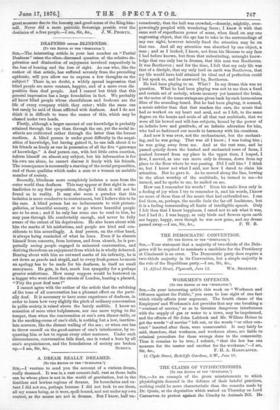DEAFNESS versus BLINDNESS.
[TO THE EDITOR OF THB "SPECTATOR."] Sin,—The interesting article in your last number on " Partial Deafness" raises the often-discussed question of the relative de- privation and diminution of enjoyment involved respectively in the loss of hearing and the loss of sight. As one who, like the author of that article, has suffered severely from the prevailing epidemic, will you allow me to express a few thoughts on the subject ? There is, no doubt, a widely spread impression that blind people are more content, happier, and of a more even dis- position than deaf people. And I cannot but think that this general impression has a large foundation in fact. We probably all know blind people whose cheerfulness and bonhomie are the life of every company which they enter ; while the same can but rarely be said of those afflicted with deafness. And I do not think it is difficult to trace the causes of this, which may be classed under two heads.
Firstly, although a larger amount of our knowledge is probably attained through the eye than through the ear, yet the social in- stincts are cultivated rather through the latter than the former medium. A blind person is under great difficulty in the acqui- sition of knowledge, but having gained it, he can talk about it to his friends as freely as one in possession of all the five "gateways -of knowledge." A deaf person can, with but little extra exertion, inform himself on almost any subject, but his information is for his own use alone, he cannot discuss it freely with his friends. The consequence is necessarily a starving of the social propensities, and of those qualities which make a man or a woman an amiable member of society.
Secondly, blindness more completely isolates a man from the outer world than deafness. This may appear at first sight in con- tradiction to my first proposition, though I think it will not be found so in reality. It may also seem a paradox that this isolation is more conducive to contentment, but I believe this to be the case. A blind person has no inducements to visit picture- galleries, or beautiful scenery, or to go where beautiful people are to be seen ; and if he only has some one to read to him, he may pass through life comfortably enough, and never be fully aware of the extent of his deprivation. He also bears about with him the marks of his misfortune, and people are kind and con- siderate to him accordingly. A deaf person, on the other hand, is always being reminded of what he loses. Even if he absents himself from concerts, from lectures, and from church, he is per- petually seeing people engaged in animated conversation, and -deriving therefrom an enjoyment from which he is wholly debarred. Bearing about with him no outward marks of his infirmity, he is set down as gauche and stupid, and to every fresh person he meets an apology has to be made for his deafness, in itself no small annoyance. He gets, in fact, much less sympathy for a perhaps greater misfortune. How many coppers would be bestowed on a beggar who went about the streets of London, bearing a placard, "Pity the poor deaf man?"
I cannot agree with the author of the article that the subduing of the tone of all conversation has a pleasant effect on the parti- ally deaf. It is necessary to have some experience of deafness, in order to learn how very slightly the pitch of ordinary conversation in polite society is raised above the barely audible. I know no sensation of more utter helplessness, nor one more trying to the temper, than when the conversation at one's own dinner-table, or in the smoking-room of one's club, is nothing but a low, inarticu- late murmur, like the distant wailing of the sea ; or when one has to throw oneself on the good-nature of one's interlocutor, by re- questing him or her to repeat every other sentence. Under such circumstances, conversation falls dead, one is voted a bore by all one's acquaintances, and the foundations of society are broken


































 Previous page
Previous page